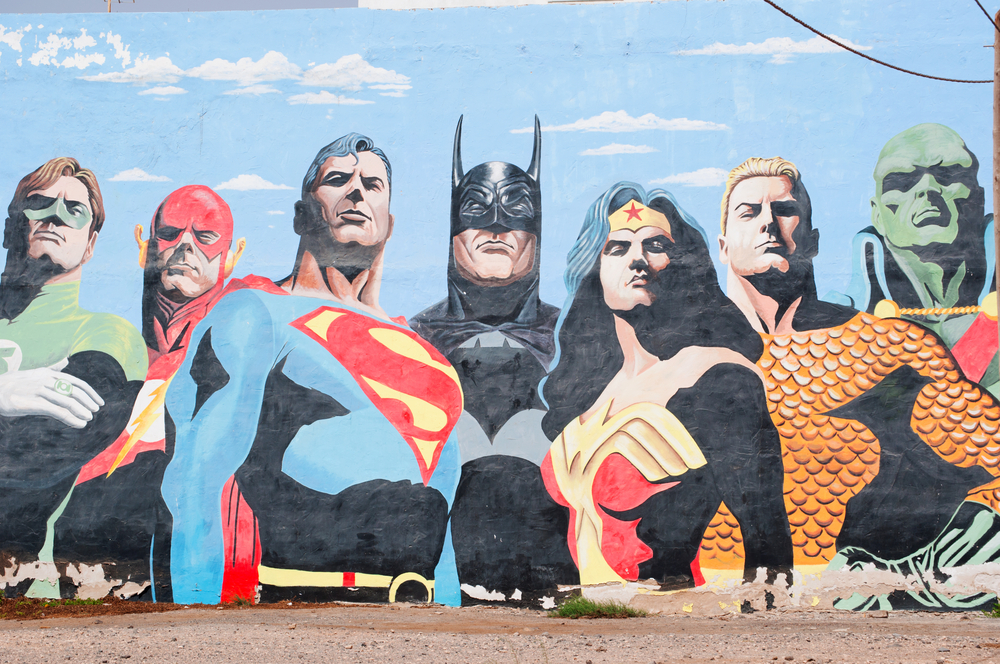This is an article about oral sex, gender roles, and fictional characters who like to dress up in dark leather and hurt each other (specifically, DC’s Batman and Catwoman).
According to a recent interview with the executive producers of Harley Quinn, an R-rated DC-owned television show streaming on HBO Max, the corporate owners of the Dark Knight vetoed the showrunners’ intentions to include a sex scene between Batman and Catwoman where the Caped Crusader would have performed cunnilingus on Selina Kyle. Explaining their decision, DC told the producers that “…we sell consumer toys for heroes. It’s hard to sell a toy if Batman is also going down on someone” because “Heroes don’t do that.”
For many reasons, it’s understandable if you’re confused right now.
Why are comic book characters (ostensibly created as children’s stories) involved in sexual content? Why is Batman (a “good” character) having sex with Catwoman (a “bad” character)? And why don’t heroes “do that”?
The first two questions are answered fairly easily: since his introduction in the pages of Detective Comics back in 1939, Batman has developed into one of the most popular, recognizable (and, therefore, lucrative) characters in American culture. With dozens of live action and animated movies and television shows, video games, graphic novels, and more, it is safe to say that, in 2021, Batman is not just for kids — HBO’s Harley Quinn is on the list of properties like the Oscar-winning 2019 film Joker and the Arkham games from Rocksteady that are marketed more directly to older fans. (To be clear: this is hardly a new phenomenon: Grant Morrison, Alan Moore, Frank Miller, and plenty of other authors have been writing “adult” Batman stories for decades.)
Similarly, Catwoman has developed since her debut in 1940. While Selina Kyle was originally a simple jewel thief and burglar (and was famously portrayed as a straightforward villain by award-winners like Julie Newmar and Eartha Kitt), recent decades have seen the character grow into more of an anti-hero who often trades flirtatious banter with Batman. From the latex-clad Michelle Pfieffer dating Michael Keaton’s Bruce Wayne in 1992’s Batman Returns to the most recent pages of Tom King’s take on the characters (which saw Kyle and Wayne in an overt romance), the sexual tension between the Cat and the Bat is a well-established element of their relationship.
So, what about the sex?
Although the quote doesn’t give us much to go on, it seems like there are at least two ways to interpret the studio executive’s warning to the Harley Quinn showrunners; “Heroes don’t do that” might mean:
1. “Heroes don’t have sex.”
2. “Heroes don’t give oral sex.”
For several reasons, option (1) seems unlikely: not only is sexual virility a common feature of the “masculine hero” trope in American cinema (think of everyone from James Bond to Captain Kirk to Indiana Jones), but the full quote suggests specifically that “Batman going down on someone” would hurt toy sales.
Again, there is more than one way to understand what “Heroes don’t give oral sex” might mean in this context:
3. “Heroes can’t be depicted performing sex acts.”
4. “Heroes don’t perform that specific sex act.”
And, again, option (3) seems unlikely: not only are sexual innuendos and double entendres commonplace on the silver screen — including even in animated DC superhero shows intended more overtly for children — but Batman himself has already been featured in sex scenes. Even if we rule out straightforwardly pornographic content, there is still plenty of evidence that heroes have sex of one kind or another on screen (or just off its edge, at the very least).
So, that leaves us with (4). In context, it seems like particular emphasis is on the term ‘heroes’ — other characters might “do that,” but heroes don’t. Why might someone think this?
Here’s where a little philosophy can be helpful. According to the French theorist Luce Irigaray, “Female sexuality has always been conceptualized on the basis of masculine parameters” (from This Sex Which Is Not One, published in 1985) — as many feminists have pointed out, the historical over-emphasis of men’s perspectives has traditionally led to the silencing of women’s perspectives. When it comes to sexuality and the experience of sex, Irigaray argues that oppressive cultural habits have turned the public understanding of sexual pleasure into something that properly “belongs” to men: “Woman, in this sexual imaginary, is only a more or less obliging prop for the enactment of man’s fantasies.” So-called “good” women (in Kate Manne’s analysis of the term) will play their part within this misogynistic system, thereby allowing the patriarchal structure (that benefits men) to be upheld. Against this, Irigaray calls for a “rediscovering” of women’s pleasure (and, by extension, women’s perspectives and power): “in order for woman to reach the place where she takes pleasure as woman, a long detour by way of the analysis of the various systems of oppression brought to bear upon her is assuredly necessary.”
Ironically, the socially-constructed nature of various gender roles, although stereotypically beneficial for men in many ways, also serves to define expectations and norms for them that, when breached, can bring shame and ridicule down onto the offending man’s head. This is just one more disturbing element of so-called “toxic masculinity” that, in short, is much like Manne’s point about how misogyny can benefit “good” women: patriarchy can hurt “bad” men (or “men who are bad at being men”). Not only can this observation help to explain, for example, homophobic reactions to gay men (but not gay women), but, as philosopher Robin Dembroff argues, “Patriarchy, it turns out, doesn’t put men on top; it elevates men who are most mirrored within manhood — an ideal that was shaped, all along, to reflect that group of men. Or, to put it simply, patriarchy puts real men on top.”
It is not hard to see, then, why a corporate exec concerned with merchandise sales might worry about Batman giving Catwoman oral sex: in such a scene, the woman — and the woman alone — would (presumably) be experiencing sexual pleasure in precisely the way that the patriarchal system cannot compute. Were the characters’ positions reversed, and Catwoman were giving Batman oral sex, then consumers and toy-purchasers would likely interpret that as just one more risqué sign of the hero’s strength and power — in short, of his manliness. For Batman to “go down” on Catwoman might suggest instead that he is submissively giving up his masculinity — and, by extension, his right to be a hero.
By definition, heroes don’t do that.



